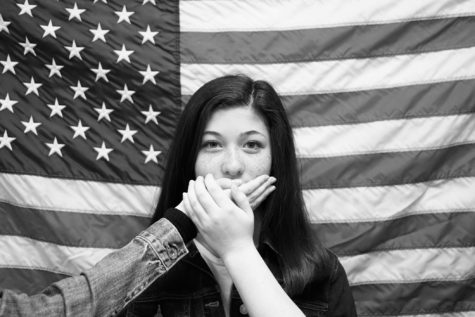Stars, stripes and silence
 It was a time of chaos. Buildings were falling, children were crying and people were locking their doors, fearing the worst.
It was a time of chaos. Buildings were falling, children were crying and people were locking their doors, fearing the worst.
It was the 2016 American presidential election.
In the days following the results, the somber mood filling classrooms was interrupted by vicious debates between my classmates. Everyone around me was ferociously defending his or her political views, but before I even had the opportunity to interject, I was told what was considered “right” or “wrong” by my classmates. Over a year later, these tensions have failed to subside. Whenever a political story surfaces, my peers antagonize any ideology different from their own.
“How can you find a conservative speaker who supports human rights?” One classmate asked. The topic of discussion was prompted by the University of Chicago’s invitation to host President Trump’s former campaign manager as a guest lecturer. I disagreed with the overt generalization of the question, but I kept my lips sealed in fear of being harshly criticized by my peers.
While I was out with a few of my friends at a party, the discussion shifted from buying new shoes at the mall to having the ability to “buy green cards.” I had a choice — I could spend time arguing with my friends or I could slip out of the conversation to avoid confrontation. Dodging this sensitive discussion would be easier than initiating a debate. I knew if I spoke, whatever stance I took would be misconstrued as an extreme viewpoint.
So I shifted from present to invisible in the conversation.
But to my friends, I may as well have been donning a red, white and blue political cap, waving an American flag and waiting for a bald eagle to soar overhead. As I turned around to mingle with another cluster of people, I heard a clamoring of violent whispers behind me, questioning my political loyalties. I had apparently made a bold statement in the simple action of suppressing my words. I put a target on my back by not choosing a side.
The venomous responses I faced were not a result of my political views, but rather the assumptions made about my beliefs from my absence of speech. I was either too conservative or too liberal for any given person’s approval. If I wasn’t going to vocalize my own views, someone else was going to do it for me.
Now, more than ever, you can’t just be an American. The country’s political climate promotes the categorization of two types of people — you’re a Democrat or a Republican. You support issues or you don’t. You’re a heathen or a saint. It is a radical concept for me to identify as an independent or to have a combination of liberal and conservative views.
We’ve all been guilty of making assumptions about others, gawking in horror if someone challenges our own ideas of what is morally correct. Although we are advised to share our thoughts through various platforms in school, oftentimes I witness my classmates talking at each other rather than with each other, dismissing opinions contrary to their own at the first hint of disagreement.
We shouldn’t be forced to censor ourselves in a school environment that prides itself on the inclusion of students with diverse ideas. We act like we value each other’s opinions, but if even one person doesn’t subscribe to the same ideology, he or she is viewed as wrong. We judge each other with the biases of broad political parties instead of listening to one another.
So I stay silent.

